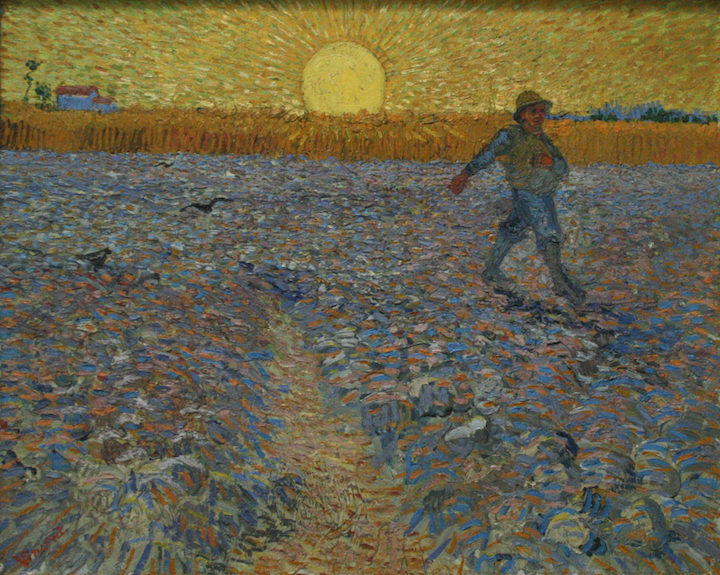Consider the rebellion of the Israelites at Mount Sinai (Ex 32). The God Who had once awed them with thunder and lightning had grown mysteriously quiet, still, and slow to respond. They had been waiting for days but had no sign of Moses, His messenger. Time to take things into their own hands. So they craft a god to their liking, one they can see and to which they have immediate access. Then they set themselves to such loud revelry that poor Joshua mistakes it for a battle down below. “There is noise of war in the camp,” he innocently says to Moses. No, it is just the din of worldly worship.
Elijah encountered the same in the prophets of Baal. (see 1 Kgs 18) Their worship was a spectacle. They hopped around the altar, slashed themselves with knives and swords, raved and cried aloud to their god. They sought a swift and big response but received none. It was the quiet, patient prayer of Elijah that won the true God’s hearing. Later, at Mount Sinai, the prophet learned first-hand that God is not in the big and loud and swift – not in an earthquake or the fire or the wind – but in the still small voice. (see 1 Kgs 19)
We are no different than the Israelites. We require that God be as we want Him: big, loud, efficient. Big and obvious, so that we can see Him and not have to walk by faith. Loud, so that we can hear Him and not be taxed by silence. Efficient, lest we have to endure any waiting. Our worship and culture follow suit. Indeed, few things are more obvious than our culture’s addiction to spectacles, noise, and instant gratification.
In contrast, our Lord gives us two parables about the Kingdom of God: the seed sown in the ground and the mustard seed. (Mk 4:26-34) These hit us where we live. They require us to detach from the big, loud, and efficient and to accustom ourselves to the hidden, silent, and slow.
The Kingdom has, first, a silent and hidden growth. It is like that seed scattered on the land that sprouts and grows of its own accord, and the sower knows not how. The growth is unheard and unseen, beyond our reach and control. It requires faith that He is indeed at work and trust that, in Romano Guardini’s words, “The silent forces are the strong forces.”
This Kingdom grows at its own pace, not the sower’s. It calls for patience. We cannot command it or set its schedule. Indeed, our schedule must yield to its pace. Further, the Kingdom is small – like that smallest of seeds that when sown, “springs up and becomes the largest of plants and puts forth large branches, so that the birds of the sky can dwell in its shade.” We prefer something more certain, something big and clearly powerful. But here we must trust in the fruitfulness of what appears entirely insufficient.

These parables provide a lesson, first, on the Kingdom within us, the working of His grace in our souls. We would like its results to be instantaneous and obvious. But grace is planted within us like a seed – small, silent, and slow growing. He calls us to trust and wait. Yes, the Lord works miracles for some – an immediate healing, perhaps, or a sudden conversion. But He does the extraordinary only as reminders of what His grace accomplishes for all in its ordinary, slow, and hidden manner.
These parables also capture the spirit of Catholic worship – which is ultimately not big, loud, and efficient but simple, silent, and slow. Although we adorn the Mass with triumphant hymns and “smells and bells,” the heart of worship consists not in its volume or efficiency but in the simple white Host silently lifted to the Father.
Under the form of bread, He is, as Saint Thomas says, latens Deitas…vere latitas– the hiding God truly hiding. Indeed, even the music of our worship is quiet. Gregorian chant is proper to the Liturgy precisely because it is a quiet and quieting music, inclining our hearts to the silent God.
So also the parables teach us about personal prayer. God intends to stretch us in faith, trust, and patience. We are to offer our prayers as the sower sows the seed, trusting in that hidden growth. We scatter our tiny little prayers in faith, believing that somehow – we know not how – they will bear fruit. And although He may at times answer swiftly, perhaps even immediately, He does so only to confirm and encourage a greater trust in His slow, steady response.
Every parable of the Kingdom ultimately describes our Lord Himself. From the cave of Bethlehem to the tomb at Calvary, Jesus is the small, silent, and still One. Indeed, it was precisely because He would not prove Himself – that is, manifest His divinity according to the world’s standards – that He was condemned.
He lives and dies in obscurity. Crucified and buried, He Himself is the small seed sown in the ground that bears great fruit. He is silently placed in the earth only to bring forth life, we know not how. Even in His resurrection, He observes this pattern, appearing without fanfare and at times obscured even from those who love Him.
Only by heeding these parables and patiently accustoming ourselves to His silent, hidden ways do we come to know Him.
*Image: The Sower by Vincent van Gogh, June 1888 [Kröller-Müller Museum, Otterlo, Netherlands] Click here to enlarge the image.















